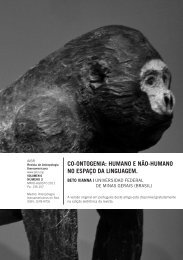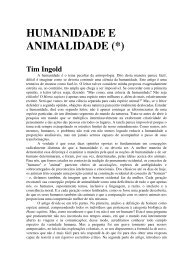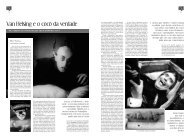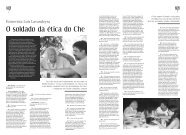Merleau-Ponty, 1964. Eye and mind. - Biolinguagem
Merleau-Ponty, 1964. Eye and mind. - Biolinguagem
Merleau-Ponty, 1964. Eye and mind. - Biolinguagem
- No tags were found...
Create successful ePaper yourself
Turn your PDF publications into a flip-book with our unique Google optimized e-Paper software.
thinking without rending it.<br />
The secret has been lost, <strong>and</strong> lost for good, it seems. If we are ever again to find a<br />
balance between science <strong>and</strong> philosophy, between our models <strong>and</strong> the obscurity of the<br />
"there is," it must be of a new kind. Our science has rejected the justifications as well as<br />
the restrictions which Descartes assigned to its domain. It no longer pretends to deduce<br />
its invented models from the attributes of God. The depth of the existing world <strong>and</strong> an<br />
unfathomable God no longer st<strong>and</strong> over against the flatness of "technicized" thought.<br />
Science manages without the excursion into metaphysics that Descartes had to make at<br />
least once in his life; it begins from the point he ultimately reached. Operational thought<br />
claims for itself, in the name of psychology, that domain of contact with oneself <strong>and</strong> with<br />
the world which Descartes reserved for a blind but irreducible experience. Operational<br />
thought is fundamentally hostile to philosophy as thought-in-contact, <strong>and</strong> if it rediscovers<br />
a sense of such a philosophy, it will be through the very excess of its daring; when,<br />
having introduced all sorts of notions that Descartes would have held to arise from<br />
confused thought—quality, scalar structures, solidarity of observer <strong>and</strong> observed—it<br />
suddenly realizes that one cannot summarily speak of all these beings as constructs.<br />
Meanwhile, philosophy maintains itself against such operationalist thinking, plunging itself<br />
into that dimension of the composite of soul <strong>and</strong> body, of the existent world, of the<br />
abyssal Being that Descartes opened up <strong>and</strong> so quickly closed again. Our science <strong>and</strong><br />
our philosophy are two faithful <strong>and</strong> unfaithful offshoots of Cartesianism, two monsters<br />
born of its dismemberment.<br />
Nothing is left for our philosophy but to set out to prospect the actual world. We are the<br />
compound of soul <strong>and</strong> body, <strong>and</strong> so there must be a thought of it. It is to this knowledge<br />
by position or situation that Descartes owes what he himself says of it, or what he<br />
sometimes says of the presence of the body "against the soul," or of the exterior world "at<br />
the tip" of our h<strong>and</strong>s. Here the body is no longer the means of vision <strong>and</strong> touch, but their<br />
depository.<br />
Our organs are not instruments; on the contrary, our instruments are added-on organs.<br />
Space is not what it was in the Dioptrics, a network of relations between objects such as<br />
would be seen by a third party, witnessing my vision, or by a geometer looking over it <strong>and</strong><br />
reconstructing it from outside. It is, rather, a space reckoned starting from me as the null<br />
point or degree zero of spatiality. I do not see it according to its exterior envelope; I live it<br />
from the inside; I am immersed in it. After all, the world is around me, not in front of me.<br />
Light is found once more to be action at a distance. It is no longer reduced to the action<br />
of contact or, in other words, conceived as it might be by those who cannot see. 32 Vision<br />
reassumes its fundamental power of manifestation, of showing more than itself. And<br />
since we are told that a bit of ink suffices to make us see forests <strong>and</strong> storms, light must<br />
have its own power to generate the imaginary. Its transcendence is not delegated to a<br />
reading <strong>mind</strong> which deciphers the impacts of the light qua thing upon the brain <strong>and</strong> which<br />
could do this quite as well if it had never inhabited a body. No longer is it a matter of<br />
speaking about space <strong>and</strong> light, but of making space <strong>and</strong> light, which are there, speak to<br />
us. There is no end to this questioning, since the vision to which it is addressed is itself a<br />
question. All the inquiries we believed closed have been reopened. What is depth, what is<br />
light, ti to ov What are they—not for the <strong>mind</strong> that cuts itself off from the body but for the<br />
<strong>mind</strong> Descartes says is suffused throughout the body And what are they, finally, not only<br />
for the <strong>mind</strong> but for themselves, since they pass through us <strong>and</strong> surround us<br />
This philosophy, which is yet to be elaborated, is what animates the painter—not when he<br />
expresses opinions about the world but in that instant when his vision becomes gesture,<br />
when, in Cézanne's words, he "thinks in painting." 33 12









